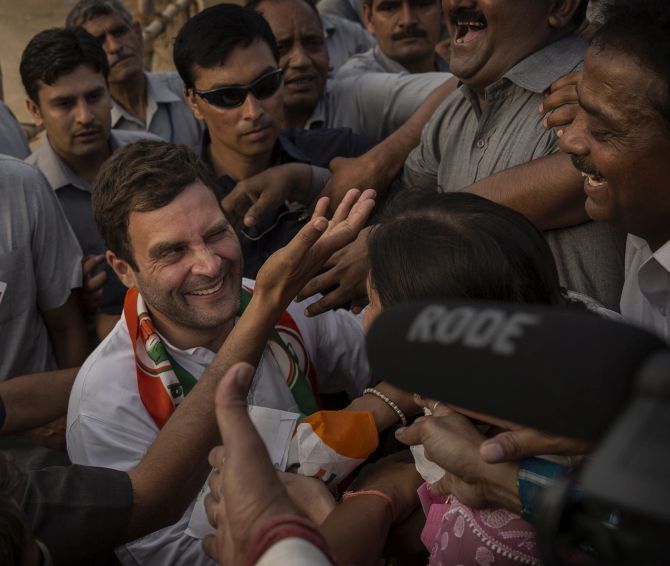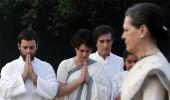'For a party with a fuzzy ideology, one that lives only for power, having a leadership that thought vaguely about returning to power in the distant future was a distinct handicap,' points out Mihir S Sharma.

In the months since the Bihar assembly election, the Modi Sarkar has had more stumbles than successes. But, in Delhi's discussions, whether left- or right-leaning, this is greeted with shrugs: So what? It doesn't matter, because the Congress is in no position to take advantage of the government's slide.
Then into this comfortable consensus came the startling news that election manager Prashant Kishor would not just sign on for the Congress' Punjab campaign, but also the big one, Uttar Pradesh in 2017 -- and, apparently, would stay in all the way to the 2019 race.
The way Kishor would tell it, he is 2-0 up against the Indian electorate; Narendra Modi's 2014 campaign and the Nitish Kumar-Lalu Prasad 2015 juggernaut.
Of course, this is not how others would tell it; there are many claimants to the 2014 success: Amit Shah, the Rashtriya Swayamsevak Sangh -- and above all, Modi himself.
But still, let's tell it Kishor's way. A non-partisan, post-ideological, election manager is a new and rare enough specimen in our politics; he is thus the cause of much excitement. Well, it appears that things are looking up for the Congress, Delhi mutters with an air of polite surprise.
Not so fast, people.
Count me in as a sceptic. I'm sorry, but what is Kishor supposed to do for the 2019 Congress? OK, I will grant you that expert management for Amarinder Singh's campaign in Punjab might well pay off. Even in Uttar Pradesh, with the right choices (Sheila Dikshit? Priyanka Gandhi?), the Congress might do better than a poor fourth, and declare victory thereby.
But 2019, surely, is a different ball game. And there are many reasons why.
For one, Modi, Kumar, even Singh, all had track records as leaders of the executive to point to. Such records make it easy for Kishor; any narrative he wishes to create can be supported, and rendered credible, simply by selling past achievements.
The sort of narrative miracle pulled off by campaigns such as Barack Obama's in 2008 is much tougher to pull together. And it is doubly tough when you're selling Rahul Gandhi.
Yes, Rahul Gandhi, post 'suit-boot' and so on, is no longer the butt of every joke -- an unexpected turn of events if ever there was one. But he still doesn't have anything to point to in his past to bolster his electability.
And, further, whatever energy Gandhi seems to have displayed in recent times comes from his obvious comfort with taking various oppositional positions.
His interventions have rarely been constructive -- if they were, they could serve as the building blocks of a positive narrative. A Narendra Modi can run a campaign mocking a flailing government because his record can be made to speak for itself; a Rahul Gandhi has no such luxury.
Kishor may have different templates in mind for each election, but he still has a standard modus operandi: Focus on leadership, and on a uniformity of message.
Part A is a problem, given the Gandhi conundrum -- they won't lead, and nobody else can. Indeed, nobody else leading is one strand of the Indira Congress DNA. Without it, the party falls apart.
And Part B is simply impossible. The Congress only succeeds when it is all things to all people: When it is simultaneously liberaliser, 'pro-poor', secular, soft Hindutva, internationalist, nativist, progressive, golden age-ist, and so on. Message fuzziness is the other strand of the Congress DNA.
So Kishor has pretty much nothing to work with at the national level. But surely he can at least build momentum? Win a few state contests, on-message and with clear leaders, and make the Congress look like a contender in 2019? Perhaps.
But then he's wagering that 2019 will be a traditional, 1990s/2000s general election, a national contest that's the sum of many state-level contests. Not, I'm sure, what he thinks 'he' did in 2014.
Given the poor fit between Kishor and the Congress, his signing on is, therefore, hardly a sign that it has reversed its decline. But, I admit, it is still hopeful for the party in two ways.
First: Kishor can serve the consultant's traditional purpose: Take the blame for obvious but painful decisions. The government's missteps had kept the party in its usual 'India's default OS' stupor; at least it is possible Kishor will shake things up a bit.
And second, Kishor's presence could be a sign that Rahul Gandhi has changed in one vitally important respect: It seems he might care about winning now. For a party with a fuzzy ideology, one that lives only for power, having a leadership that thought vaguely about returning to power in the distant future was a distinct handicap.
But Kishor isn't interested in building sensitive organisations, or healing the country, or listening to conversations, or asking the right questions, or any of the other ersatz New Age stuff we have to put up with from Rahul Gandhi. Kishor is interested only in winning. Perhaps that actually might make a difference.












 © 2025
© 2025